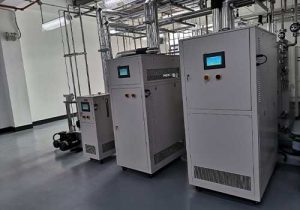chiller cool
Chiller Cool: Definition and Working Principle
A chiller cool system, or simply a chiller, is a mechanical refrigeration system that provides cooling for various applications. Chillers work on the principle of vapor compression refrigeration, where a refrigerant is compressed, condensed, and expanded to absorb and remove heat. The basic components of a chiller include a compressor, condenser, evaporator, and expansion valve. Chillers can be classified into two main types: water-cooled and air-cooled, each with its unique working principles and applications.

Applications of Chiller Cool Systems
Chiller systems are widely used across different industries. They are essential in commercial buildings for air conditioning, in industrial processes for temperature control, and in data centers for cooling servers. Chillers are also used in the food and beverage industry for refrigeration and freezing, in healthcare for medical equipment cooling, and in the chemical industry for process cooling. Their versatility makes them indispensable in maintaining optimal temperatures for various processes.
Market Trends in Chiller Cool Systems
The global market for chillers is expected to grow due to increasing demand from various industries. Factors driving this growth include technological advancements, energy efficiency requirements, and the need for sustainable cooling solutions. Chillers are becoming more energy-efficient with the incorporation of variable speed drives and the use of natural refrigerants, aligning with environmental sustainability goals.

Efficiency of Chiller Cool Systems
Efficiency is a critical factor in chiller systems. Modern chillers are designed to have high coefficients of performance (COP) and energy efficiency ratios (EER), which measure the efficiency of the unit in converting electricity into cooling output. Energy efficiency is further improved by using variable frequency drives (VFDs) for the compressors, allowing them to operate at variable speeds to match the cooling demand.
Environmental Impact of Chiller Cool Systems
The environmental impact of chiller systems is a significant concern. Chillers contribute to sustainability by using natural refrigerants with low global warming potential (GWP) and by integrating with renewable energy sources, such as solar panels. Additionally, chillers can be backed up by gas-driven or diesel-driven generators, increasing their robustness during power outages and reducing reliance on grid electricity.

Conclusion
Chiller cool systems are vital in providing cooling for a variety of applications. As the market for chillers continues to grow, there is a focus on energy efficiency, sustainability, and technological advancements. Chillers are becoming more efficient and environmentally friendly, making them a preferred choice for industries seeking to optimize their cooling processes and reduce their environmental footprint. Understanding the benefits and market trends of chiller systems is crucial for industries seeking to maintain optimal temperatures while minimizing their environmental impact.
Related recommendations
Working Principle and Characteristics of Air-cooled Chiller and Water-cooled Chiller
1731Working Principle and Characteristics of Air-cooled Chiller and Water-cooled Chiller In the refrigeration industry, chillers can be divided into air-cooled chillers and water-cooled chillers....
View detailssmall water chiller unit
855Small Water Chiller Units: Efficient Cooling for Limited Spaces Small water chiller units are increasingly becoming the cooling system of choice for a variety of applications where space is at ...
View detailswater cooled chiller cycle
388Water Chiller AC Units: Cooling Solutions for Diverse Applications Water chiller AC units are essential in maintaining comfortable temperatures in commercial buildings, industrial processes, an...
View detailsSelection, Configuration and Application of Industrial Chillers
1628Selection, Configuration and Application of Industrial Chillers There are many processing plants that use industrial chillers, but many friends don’t know how to choose the unit when they buy...
View details
 LNEYA Chiller
LNEYA Chiller






HelloPlease log in